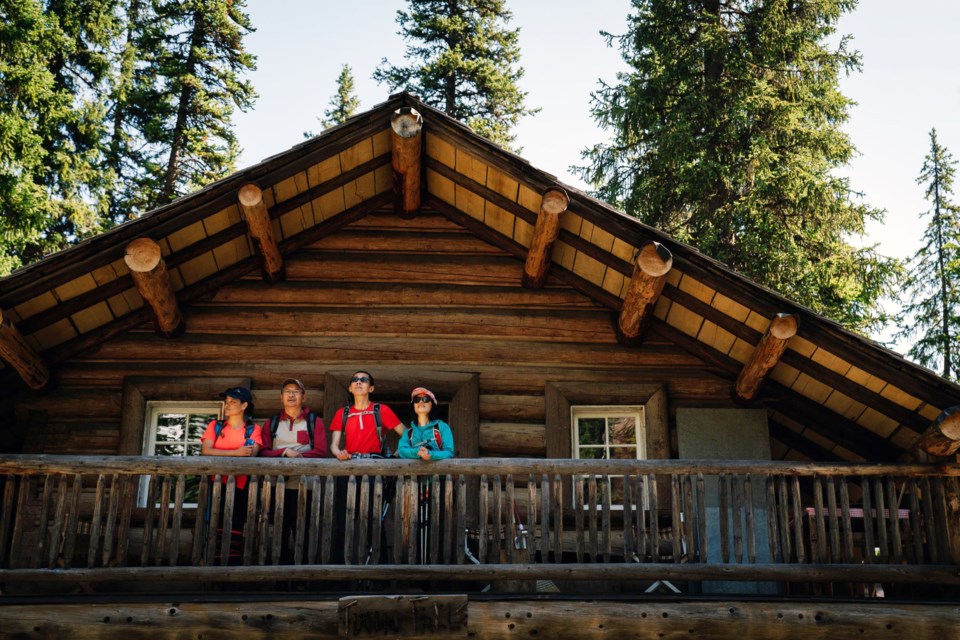FIELD, B.C. – The Alpine Club of Canada has won the right to operate the historic Twin Falls chalet in Yoho National Park, with plans for overnight accommodation and a tea house for hikers.
Parks Canada issued the Alpine Club of Canada (ACC) with a 10-year licence of occupation for the Twin Falls Tea House National Historic Site following an open and competitive bidding process. Although there were two site visits, the ACC was the only bidder to submit a formal proposal.
“We love the history of the place, we love the area and it’s a place that our members can’t get enough of,” said Keith Haberl, the ACC’s director of marketing and communications.
“It’s a European model of a tea house and accommodation that people have been asking for, for a lot of our facilities for a lot of years.”
Twin Falls Tea House, located about 8.5 kilometres from the Takakkaw Falls parking lot, sits near the foot of Twin Falls in the Upper Yoho Valley. It was designated a national historic site in 1992 because of its rustic design tradition and its association with outdoor recreation in the national parks.
The ACC, which operates the largest network of backcountry huts in North America, was awarded the licence of occupation after Parks Canada locked out the previous operator, Fran Drummond, who had run a summer business at the backcountry lodge and teahouse for 57 years.
Parks Canada locked the doors to the lodge in 2019, and while the full details are not known, Drummond said much of the dispute had centred on rent, some of which she had not paid since her lease expired in 2014.
Haberl said the ACC plans to offer overnight accommodation and catered meals at Twin Falls chalet, as well as a teahouse serving lunch, snacks and beverages for use by day hikers as well.
He said he’s not sure of the overnight accommodation capacity, but added the best guess is probably around eight.
Given the ACC’s recent acquisition of Shadow Lake Lodge in Banff’s backcountry, Haberl said running Twin Falls chalet is an extension of that move to a more catered backcountry experience.
“We’re finding that works really well for a portion of our membership – maybe it’s older, or families with young kids or maybe people who want to see the backcountry in a slightly different way,” he said.
“It’s a catered experience where people can have a little bit more privacy, they can have meals prepared for them and spend more time enjoying the place – it’s right up our alley.”
Haberl said because Twin Falls chalet is a federal heritage site, there are limits and guidelines on what can be done.
“There are a few things that we do need to be done,” he said, adding new staff quarters and a new patio are needed.
“There’s a number of upgrades, including the kitchen and the micro-hydro for running the place.”
Renovation work won’t begin until at least June when the road to Takakkaw Falls opens.
“We’ll hopefully be welcoming guests sometime later in the summer,” said Haberl.
Tracey Leblanc, townsites and realty manager for the Lake Louise, Yoho and Kootenay field unit, said any proposal the ACC puts forward will have to go through Parks Canada’s development review process, including an environmental assessment review.
“We review it against all of our policies and regulations to ensure that it meets and it follows our guiding policies and regulations,” she said.
Proponents are not typically required to notify the public of renovations to the interior of a property. However, depending on the scope and scale of the proposal, Leblanc said Parks Canada may require public engagement as part of the development review process.
“Parks Canada is pleased to be working closely with the Alpine Club of Canada,” she said.
Twin Falls Tea House was built in association with the Canadian Pacific Railway in three phases – the initial one-storey log cabin (1908-1910), a two-storey chalet and lodge (1922-23), and a link between the two units (1925-28).
Leblanc said the national historic site has been a destination for generations of hikers exploring the Yoho backcountry.
“It has huge historical value,” she said, noting it was originally constructed to provide outlying accommodation for trail riders and mountaineers in Yoho National Park.
“It was part of that development of the backcountry tourist facilities that were built at scenic points along the trails in the parks and that includes lodges, and tea houses and bungalow camps – and so it is a rare surviving example of this.”




